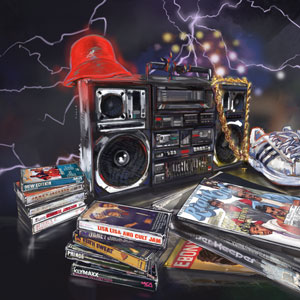
 ***** Black Ensemble Theater has produced a fast-paced, energetic, and fun romp through the history of popular songs from forty years ago. Called “The Time Machine”, this jukebox musical uses the pretense of high school senior Derrick Taylor (Brandon Lewis) needing to know more about 1980s’ music history for a class assignment. When Derrick’s mother finds out that her son has waited until the very last moment to research and write his essay, she is not only upset with him but recommends that he visit his “Crazy Uncle Mike” (Thee Ricky Harris), who knows a lot about this time period. It seems that the uncle has invented a time machine—and by taking Derrick back into the past to learn about the music of the ’80s, the audience is treated to a remarkable retrospective. When the songs are performed by a cast of talented singers, dancers, and musicians, it becomes an adrenaline rush for all of us.
***** Black Ensemble Theater has produced a fast-paced, energetic, and fun romp through the history of popular songs from forty years ago. Called “The Time Machine”, this jukebox musical uses the pretense of high school senior Derrick Taylor (Brandon Lewis) needing to know more about 1980s’ music history for a class assignment. When Derrick’s mother finds out that her son has waited until the very last moment to research and write his essay, she is not only upset with him but recommends that he visit his “Crazy Uncle Mike” (Thee Ricky Harris), who knows a lot about this time period. It seems that the uncle has invented a time machine—and by taking Derrick back into the past to learn about the music of the ’80s, the audience is treated to a remarkable retrospective. When the songs are performed by a cast of talented singers, dancers, and musicians, it becomes an adrenaline rush for all of us.
The first act is marvelous; the second act is sublime! (How many superlatives can I use?) We see the artists and their on-stage imitators: for example, Bobby Brown, Ricky Bell, and Keith Sweat (Jaitee); Prince and El Debarge (Jared Brown); and Lisa, Lisa and Irene Cara (Micah Alyce). Then there’s the likes of Michael Jackson (Isaac Ray) singing “Billie Jean”, Whitney Houston (Britt Edwards) singing “I Wanna Dance with Somebody (Who Loves Me)” and Madonna (Vu) singing “Material Girl”, plus there’s many, many more! Other cast members include: Ama Kuwonu, Ben Izlar Jr., Isaiah Engram, Trequon Tate, Miciah Lathan, and Vincent Jordan. I enjoyed listening to so many of my favorite songs like “Flashdance… What a Feeling” and “I’m Bad” and loved the energy of the hip hop music in the second half. The show is smartly written and superbly directed by Daryl D. Brooks in a presentation that is educational as well as highly entertaining.
Set design and lighting by Denise Karczewski could not have been better, given this story. The stage is set up very nicely with five doorways: two keyholes, two rectangular doors on each side, and one in the middle. Circular windows abound. Lights that outline these doors and windows change colors throughout the performance to differentiate among the various songs, scenes, and entertainers. Having many of the actors use a semi-circular conveyor belt in the middle of the stage helps to speed up the action and create additional movement. This contrivance is well done, as is the sound design by DJ Douglass (although I had to wear a pair of earplugs).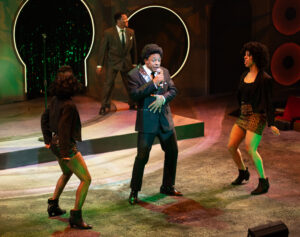
The music and the arrangements cannot be any better, thanks to music director Robert Reddrick, band leader Adam Sherrod, and vocal arranger (and uncle) Thee Ricky Harris. Of course, there’s all the ensemble dancing to boot, thanks to choreographer Christopher Chase Carter—and also solo moves by Lewis. I especially liked Tony Churchill’s projection design with videos of a cassette tape in motion, featuring the names of the various songs, the artists who performed them, and their publishers/record labels. Above that video, is a projection of a two-band radio dial that indicates the year when a song was first popularized. Throughout the performance, the dial keeps going back and forth throughout the 1980s: The songs are grouped more-or-less by genre and artist history rather than by chronology. (Incidentally, I couldn’t figure out if the SW on the two bands referred to “short wave” or “sine wave.” But that’s just an aside!)
Costume design by Marquecia Jordan and wig design by Keith Ryan work well for this show. Many of the performers wear costumes and hairstyles resembling those of the original artists. I liked the joke towards the beginning about going back in time to see the shoes they are wearing, because—as followers of fashion know—the Converse gym shoes of the 1980s are back in style again. So are ripped jeans: once the fashion statement of that era, thanks to Madonna and others. We get to see the cassette player, Sony Walkman, and corded phone of yesteryear (versus the laptop, tablet computer, and cell phone of today), courtesy of prop designer Jessica Moore. While the technology may have changed over the past four decades with regard to how we listen to music, it is the enjoyment of it that ultimately counts.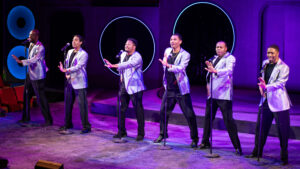
Even though the storyline that ties everything together is rather contrived, it nevertheless provides us with several meaningful messages. Although Derrick initially disparages the songs of the ’80s and calls them “old folks’ music”, he learns better under the tutelage of his wise, kind, and patient uncle. By learning about the origins of contemporary music, Derrick not only gains a greater appreciation of the styles back then but also a better perspective on the songs and artists of today. Another message of the show is that it is very important to give a young person the attention they need when it comes to both their schoolwork and their life in general. Following up on this thread, I would have liked to have seen a return of the mother in the second act to praise her son for his diligence and change of habits under the tutelage of his uncle. Perhaps Derrick got an “A” on his assignment, or maybe he didn’t have time to complete it after all (with all his incredible adventures). But it would have been nice to see the mother say—if only for a moment—how proud she is of him for listening to her brother and gaining some knowledge about a subject he didn’t know about before.
Not lost on me is that Derrick’s last name is Taylor: the same as Jackie Taylor, the founder and CEO of Black Ensemble Theater. At the end of the performance on opening day, Jackie Taylor made a special shoutout to her brother in the rear of the audience. Could he be the real inspiration for Uncle Mike, the inventor of the time machine? And of course, could Jackie herself be the real inspiration for Derrick’s mother in the first act? Of course, this is all idle speculation! What I do know is that this is a great trip down memory lane. Many of the people in the audience were probably between 14 and 32 at the time when these songs first came out, so they have fond memories of the original artists and know all the words and music.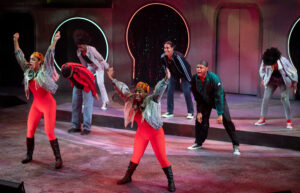
But now it’s time for a new generation to learn about the popular music of this era. Regardless of your age, go out and immediately buy tickets to see this exemplary and uplifting production! You will enjoy yourself immensely!
“The Time Machine: A Tribute to the ’80s” is playing through April 14, 2023, at Black Ensemble Theater, 4450 N. Clark Street, in Chicago.
Tickets: $55-$65.
If you purchase a senior ticket (ages 65 and up) or a junior ticket (ages 17 or younger) you must provide proof of age at the box office.
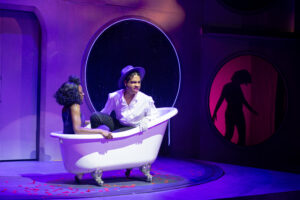 Performance schedule:
Performance schedule:
Fridays – 8:00 p.m.
Saturdays – 3:00 p.m. and 8:00 p.m.
Sundays – 3:00 p.m.
For more information about this show or to purchase tickets, visit: https://ci.ovationtix.com/35140/production/1189153?_ga=2.60870575.208164017.1708718083-1873657107.1708718083.
Your E-ticket will be sent to your email. For your convenience, you can print your ticket at home or bring it on your mobile device.
If you require wheelchair accessibility seating, please call the box office at 773-769-4451.
For general information and to learn about their other offerings, go to: https://blackensembletheater.org/2023-season-of-excellence-2/.
Valet Parking is available for $10 (CASH ONLY)
To see what others are saying, visit www.theatreinchicago.com, go to Review Round-Up and click at “The Time Machine: A Tribute to the ’80s”.


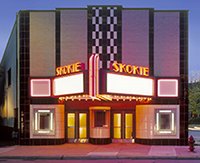


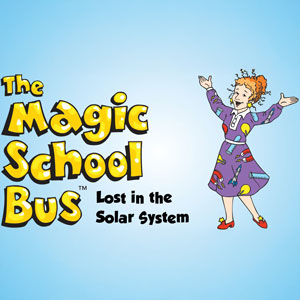
More Stories
“The Magic School Bus: Lost in the Solar System”
“February House” reviewed by Julia W. Rath
” A Lie of The Mind”